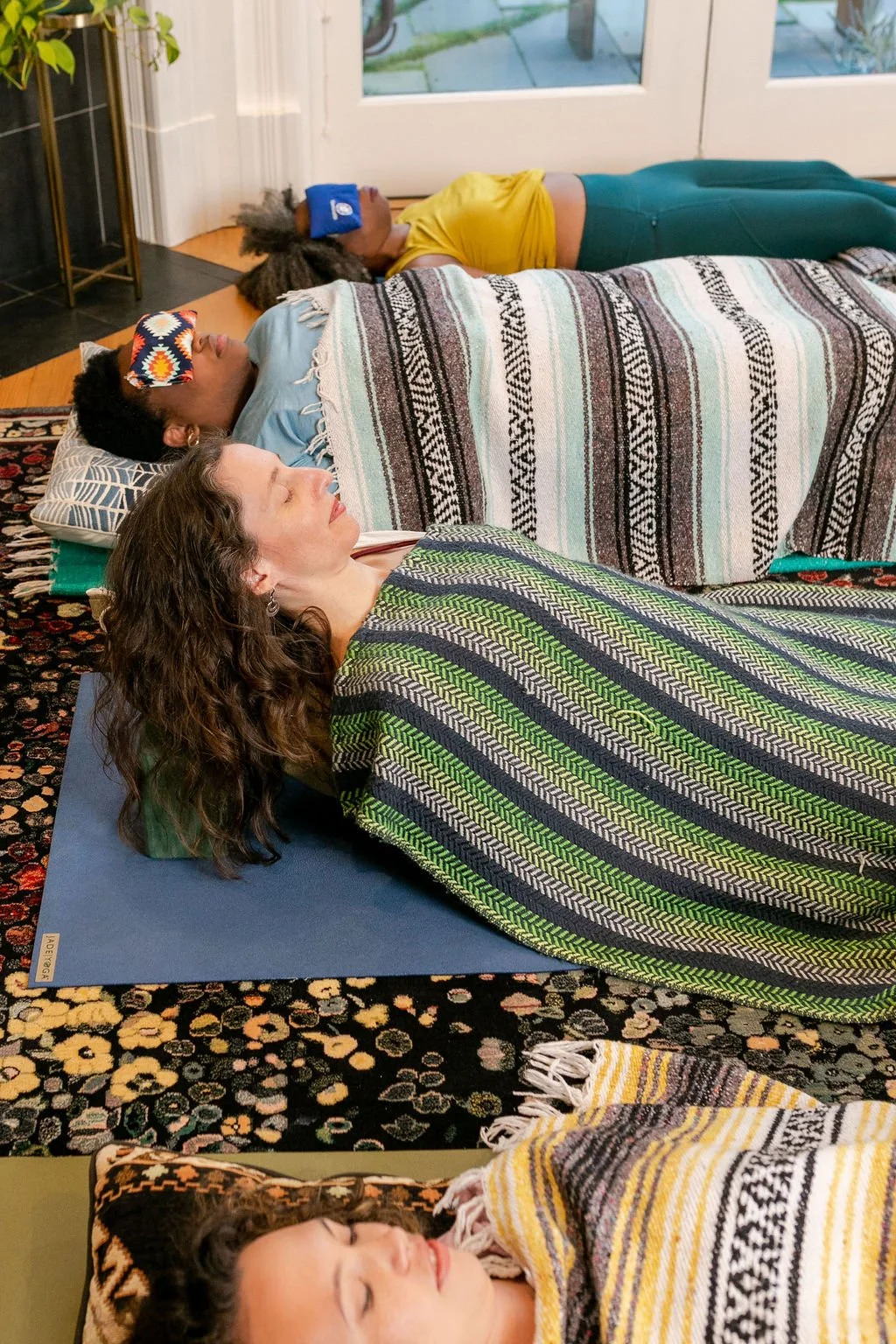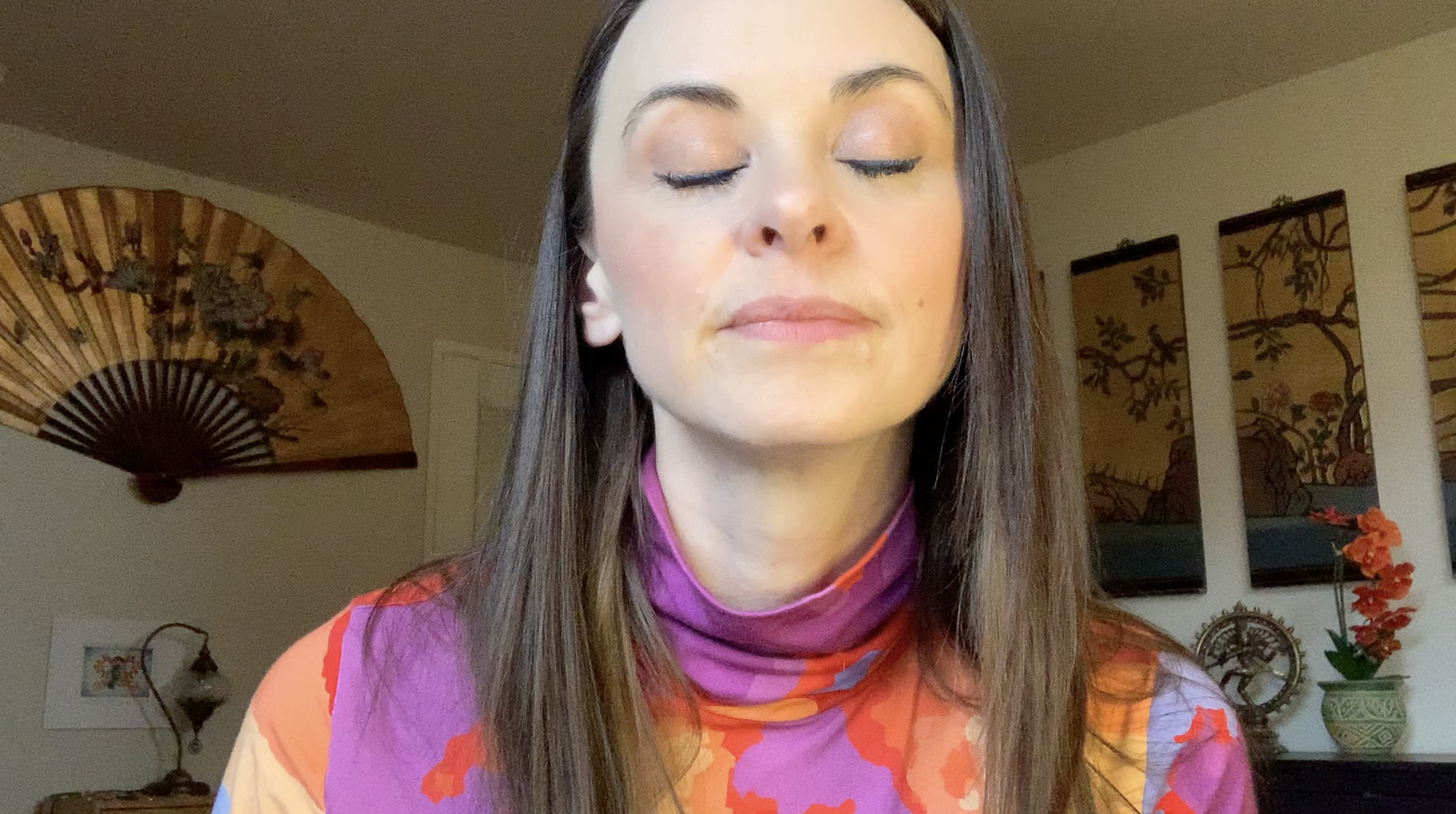Meditation helps you Reset when you’re Anything BUT at Peace
WITHIN Meditation teacher Devon Pipars
This post originally appeared on WITHIN Meditation’s blog on 6/19/20.
Space to Ask Questions
In a recent WITHIN Meditation class, I gave a mantra in English to use as an anchor for the restless mind. In meditation, anchors are aspects of the present moment that keep us tuned into what is actually here and now – such as the body and its senses, the breath, and if directed, the attention of the mind. The phrase was “I am peace”, and the invitation was to repeat this silently in time with the breath.
Afterwards, a student brought up a question that, at the time, I answered briefly; but knowing how much this topic is top of mind for many of us, I wrote the dialog below to explore it in more depth.
Treina Alexander’s (YogaLove founder) hands on Hannah Knapp’s (WITHIN founder), providing comfort and connection
Student: I’m just wondering why we should repeat “I am peace” when it doesn’t seem true…
… considering what’s happening in the world right now, my experience inside and out is not one of peace.
Devon: Thank you for that courageous admission! You’re exactly correct. This statement - “I am peace” - is never true on the level of the what is being observed, whether that’s the external world or the internal experience.
The absolute truth of the changing field is that it changes. We look outside, and every day brings new events, challenges, and information; even mountains are constantly shifting. We look within, and the thoughts, emotions, sensations, and even breath are ever-changing.
Only through the practice of meditation can we begin to discover that there is in fact one aspect which remains absolutely unchanging, as the observer of all change. And that is awareness itself.
So, the answer to your question depends on where you’re placing your attention, and therefore your sense of self:
If you choose to zoom into and harmonize with the constant change, your experience of yourself will be restless.
If you choose to zoom out and remain as the unchanging observer, your sense of self will be peaceful, easy and open.
WITHIN Meditation co-founder Hannah Knapp in center under a green, blue, and white striped blanket, resting alongside three others
Student: But isn’t this just a kind of apathy and denial when what the world needs is action?
Devon: Is sleep a denial? Or do we tend to accept it neutrally, as a necessary (and often craved) state of letting go in order to heal the body and refresh the mind?
It’s well documented that extended sleep deprivation can lead to temporary insanity. Excessive identification with that which constantly changes can bring a similar experience.
It’s not unusual for people to describe their current daily experience as overwhelmed, plagued by incessant looping thoughts, anxious, fearful, hopeless, or burnt out. There is no energy to persevere with right action in these states. There is no space to move forward with natural positivity.
It would be nonsensical to declare that getting a good night’s sleep is socially irresponsible. In the same way, taking a timeout to reset in meditation is just expanding your perspective to a refreshed and restored state of clarity and calm.
And just as with sleep, in the neutral observation of meditation we are freed from the confines of the person. But unlike the deep unconsciousness of sleep where we don’t become enlightened, in meditation we can observe and evolve.
As we consciously spend time free from our personal self in the original and pure sense of self, we discover that this perfect awareness and effortless existing is the essential, underlying nature of all beings. Transcending even the idea that we are all connected, in meditation we’re one and the same, and the ultimate energy of that oneness is pure, unattached love.
Devon Pipars leading a guided meditation in a pink and orange colored shirt
Student: But how does experiencing our unchanging nature as peace and love actually motivate us to help and serve others?
Devon: This discovery, while inherently powerful, is most useful when it informs our choices and behavior in worldly engagement. Oneness doesn’t have to mean passivity.
Another student recently observed that one unexpected benefit of the meditation practice is discovering a natural fearlessness to be herself. She’s finding an easy courage to express her truth simply, to speak up when it’s difficult, and to risk more, being securely grounded in and fortified by the recognition of her unchanging, heart-centered nature.
The paradox of meditation is that as we spend more and more time in the universal and impersonal self, we feel more free to be unapologetically who we truly are.
Meditation also frees us to move forward in the dualistic, changing field of the world with less otherness, and in the context of the current movement for racial equality and social justice, with a sense that until everyone is free, no one is.
In the words of Dr. Martin Luther King Jr.,
“What is needed is a realization that power without love is reckless and abusive, and that love without power is sentimental and anemic. Power at its best is love implementing the demands of justice, and justice at its best is love correcting everything that stands against love. And this is what we must see as we move on.”
He beautifully illustrates that we all need the ability to access and hold both truths - power and love, action and peace, change and unchanging. Only once we uncover that balanced truth within ourselves, will we be successful at reflecting and creating that balance in the world around us.
WITHIN Meditation shares their live online daily guided meditations on the TendWell Schedule and in the On-Demand Library.
Visit WITHIN Meditation’s website to learn more about their events, retreats, and workplace sessions.




